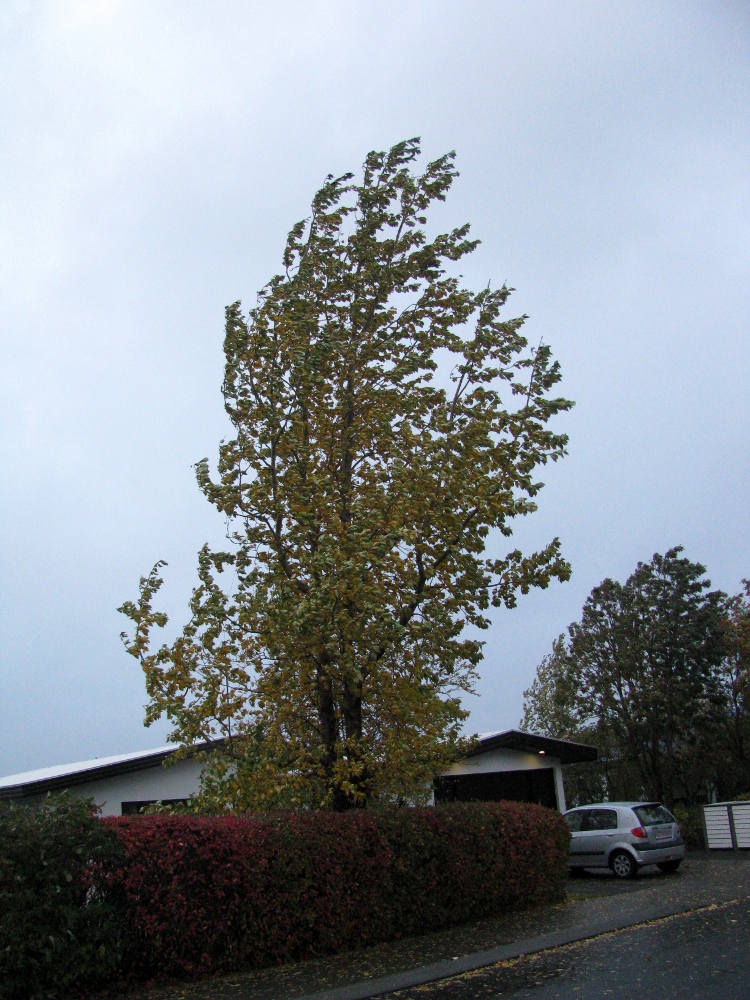Feeling under the weather? Posted by hulda on Sep 15, 2013 in Icelandic culture, Icelandic grammar
 A certain sign of autumn has now arrived to Iceland: the storms. It’s good to remember that Icelanders call some kinds of storms drizzle, a bit breezy etc., so always be prepared to almost get your window blown in if the weather forecast states there’ll be light rain and some wind. Rubber boots and a raincoat rather than an umbrella are your choice if you ever have to leave the house, because you’ll soon notice that aside of the fact that the promised rain is more like a wall of water, there won’t be a definite direction for the wind. You’ll be attacked on all sides simultaneously as if you just walked into a car wash, something that roughly three years ago during my first autumn here taught me why no one but tourists use umbrellas in Iceland – they do nothing.
A certain sign of autumn has now arrived to Iceland: the storms. It’s good to remember that Icelanders call some kinds of storms drizzle, a bit breezy etc., so always be prepared to almost get your window blown in if the weather forecast states there’ll be light rain and some wind. Rubber boots and a raincoat rather than an umbrella are your choice if you ever have to leave the house, because you’ll soon notice that aside of the fact that the promised rain is more like a wall of water, there won’t be a definite direction for the wind. You’ll be attacked on all sides simultaneously as if you just walked into a car wash, something that roughly three years ago during my first autumn here taught me why no one but tourists use umbrellas in Iceland – they do nothing.
Another unavoidable side-effect of autumn rolling in is that it starts the flu season. Let’s prepare for it!
Ég er veik/ur (= I’m ill). The adjective follows the gender of the subject, therefore: Jón er veikur, Anna er veik (= Jón is ill, Anna is ill). Notice though that everything depends on the subject word, not the actual gender of who you’re talking about.
Kennarinn okkar heitir Anna. Í gær var kennarinn veikur. (= Our teacher’s name is Anna. Yesterday the teacher was ill.) Barn Önnu var veikt líka (= Anna’s child was also ill).
The example sentences are simplistic, but I hope they’ll illustrate what I mean – no matter if your teacher is female, if you’re using the work “kennari” (= teacher) that is masculine the following adjective has to be in masculine form. If you’re using the word “barn” (= child) you’ll use the neuter form of the adjective, because of the gender of the subject (regardless of whether the child is a girl or a boy).
When you’re defining what kind of illness you have you’ll be using the vera með form of owning, which might feel a bit weird after first learning the basic rules of eiga, hafa and vera með (link). Why not use hafa instead? After all, an illness isn’t something concrete that you could hold in your hand so wouldn’t it more logically follow the rule that you use hafa for abstract things such as time etc.? The reason behind it cannot really be explained, said our professor when I asked her about it. It just is this way, so your best option is just to learn it by heart as an interesting exception to the rule.
Use the þolfall (= accusative) form after vera með:
Ég er með hita (= I have fever).
Ég er með kvef (= I have a cold).
Ég er með hósta (= I have a cough).
You can also simply declare that you’re aching or hurting in a certain part of the body:
Mér er illt í…/Ég er með verk í… (= I’m hurting in…/I have an ache in…)
You’ll always follow any of these with the þagufall (= dative) form of the ailment, f.ex.
Mér er illt í höfðinu (= I have a headache).
Ég er með verk í maganum/hálsinum (= I have a bellyache/pain in the throat).
In the above examples the definite form of the word is used for the same reason that you’d rather say “I have pain in the chest” than “I have pain in a chest”. 😉
You can use the vera með form to describe other health problems as well, such as:
Ég er með sykursýki/ofnæmi (= I have diabetes/allergy). Ég var með taugaáfalli (= I had a nervous breakdown).
Don’t worry too much though if you end up being ill in Iceland. The health care people speak good English so you’ll be able to explain more complicated health issues than your Icelandic skills would allow. The cost of going to a doctor as a foreigner (in other words someone who hasn’t lived in the country for 6 months, a time that is required before you belong to the Icelandic social security system) is currently 9000kr (~75$). Medicine costs are naturally high as well because of Iceland’s high VAT, but at least hospitalization does not cost you anything, so deducted from this I could say that it’s completely ok to get a serious, life threatening health issue in Iceland but stay away from ear infections, tooth aches and the like – those will wreck your wallet. 😀
To those of you who are currently studying in Iceland, learn these words well:
Tíminn fellur niður vegna veikinda/veðurs (= The class is canceled due to (teacher’s) illness/the weather). Check your e-mail well for these words in the autumn season, they can show up a mere hour before the class is due to start!
Here’s how to pronounce the most important ones. Stay healthy, everyone!
Vocabulary:
Flenza (F) = influenza
Hósti (M) = cough (að hósta = to cough)
Hnerri (M) = a sneeze (að hnerra = to sneeze)
Hor (M) = snot, mucus
Hiti (M) = fever (að vera með hita = to have a fever)
Heilakveisa (F) = migraine (another word for migraine is mígren)
Höfuðverkur (M) = a headache
Kvef (N) = cold (að fá kvef = to catch a cold, að vera með kvef = to have a cold)
Að snýta sér = to blow one’s nose
Spýja (F) = vomit (að kasta upp/æla/spúa = to throw up)
Timburmenn (M) = hangover

Build vocabulary, practice pronunciation, and more with Transparent Language Online. Available anytime, anywhere, on any device.
About the Author: hulda
Hi, I'm Hulda, originally Finnish but now living in the suburbs of Reykjavík. I'm here to help you in any way I can if you're considering learning Icelandic. Nice to meet you!







